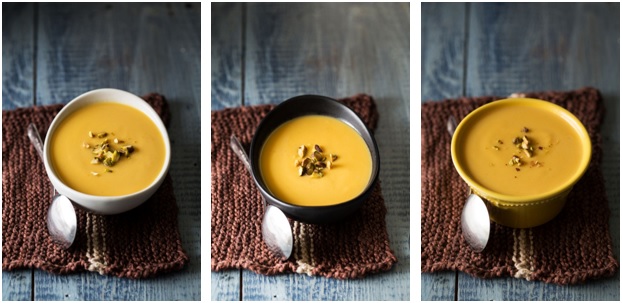Food photos sell. Travel magazines need photos of food from the places they feature. Cafes and coffee shops want fine art photos of food for their walls. And stock photo agencies need LOTS of photos of all kinds of food. Not only are food photos lucrative, but you can easily take them right in your home, by a window. Yesterday I gave you Portland food photographer Lara Ferroni’s number one lighting tip for food photography. (Read it here.) Today, here are five handy styling tips… Take a look at these three photos of soup shot by Lara Ferroni. Which one do you like best? 
- Prevent shine. Look for plates and bowls with a matte finish to help avoid distracting glare.
- Coordinate. Think about which colors would look good with the food. In the photo on the right, the bowl and the soup are so close in color that they almost appear to be one solid object. Skip the “matchy-matchy” and look for contrasting or coordinating colors.
- Scuff it up. Use old, scuffed silverware or take fine sandpaper to silverware you plan to shoot, so you don’t get detailed reflections of the whole room in your spoon.
- Keep it simple. Don’t spring for plates and bowls with loud colors or patterns. You want to keep the attention on the food.
- Go small. The bowls in these photos are about three inches across, but they appear larger. That’s generally the case. (Note: When you use small plates, normal silverware can appear too big, so look for small forks and spoons, too.)
If you don’t have a lot of money to buy props, look for simple items in your cabinets… or see what you can find at a second-hand store.
Travel Photography Resources
5 Dos and 2 Don’ts for Travel Photography
Take Great Photos And Get Paid More For Your Travel Articles
Turning a Photography Hobby into a Monthly Income
The Pros Of Selling Your Images As Stock Photography
16 Mobile Photography Tips And Tricks Every Photographer Should Know

